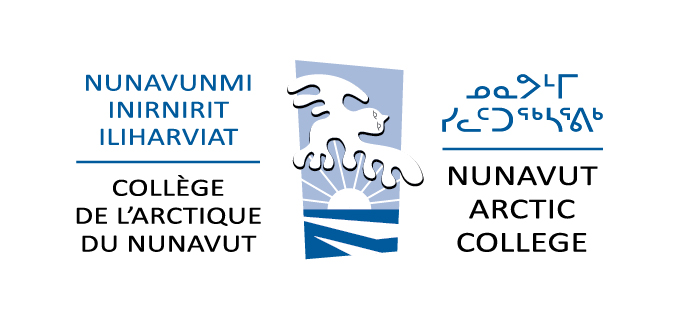About Nunavut Arctic College
MISSION:
to strengthen the people and communities of Nunavut by providing life-long learning opportunities for adult nunavummiut by delivering quality career programs developed with input from our partners throughout the arctic and canada, and by making the benefits of inuit traditional knowledge and southern science more accessible.
VISION:
Nunavut Arctic College will be recognized as the post-secondary institution of choice for the people of Nunavut by offering a wide range of pathways to culturally relevant programs of the highest national standard. The College will promote opportunities, innovation and leadership while enhancing knowledge of Inuit language and culture to permit all learners to proudly take their place in Nunavut and beyond.
Nunavut Arctic College has a strong commitment to provide high quality educational opportunities to all residents of Nunavut. The College has five campuses:
Kitikmeot Campus located in Cambridge Bay;
Kivalliq Campus, Sanatuliqsarvik (Nunavut Trades Training Centre), and Kivalliq Hall are located Rankin Inlet;
Nunatta Campus located in Iqaluit;
Nunavut Innovation & Research Institutes are located in Iqaluit, Arviat, Cambridge Bay, Rankin Inlet, and Igloolik;
Piqqusilirivvik Inuit Cultural Learning Centre is located in Clyde River with satellite locations in Baker Lake and Igloolik.
Community Learning Centres located all 25 communities of Nunavut bring our programs home to people throughout the territory. These Centres are a doorway to a wider world of learning opportunities. Each Community Learning Centre is staffed by an Adult Educator who can provide information and guidance to anyone seeking further education.
Adult Educators are able to conduct academic assessments and assist people in making vocational and educational choices. They can also help individuals to find information on career programs through Nunavut Arctic College or other community colleges and universities. College courses are designed to meet the ever-changing needs of the people of Nunavut.

"Nunavut Arctic College serves the largest post-secondary service region in Canada and one of the largest in the world. As an institution we strive to deliver lifelong learning opportunities that empower students and communities while celebrating Inuit Language and Culture. "
— Rebecca Mearns, A/President

PRESIDENT'S MESSAGE
Lifelong Learning… in the Arctic… for the Arctic
Nunavut Arctic College serves the largest post-secondary service region in Canada and one of the largest in the world. As an institution we strive to deliver lifelong learning opportunities that empower students and communities while celebrating Inuit Language and Culture.
2019-2020 has been a year of challenges and change. I have recently entered the role of Acting President of Nunavut Arctic College I am honoured to take on this opportunity and humbled by the support I have received from those around me. Although we have a great deal of work ahead of us, I am confident that the college faculty, staff, and students are prepared to take it on.
Despite the major impacts during the 2019/2020 Academic Year, the college community has worked tirelessly to continue the delivery of programs to students. I am thankful to our faculty, staff, and especially our students for their patience and resilience in face of the challenges of this academic year.
While we recognize that these events have delayed some of the work the college has been doing, we must also celebrate the achievements despite the hardships. The Nunavut Arctic College and Memorial University of Newfoundland officially signed a 10-year Memorandum of Understanding, the foundation of a formal partnership between the two institutions. This included the renewal of the Nunavut Teacher Education Program (NTEP) which introduces an Inuktut Language Certificate to be embedded within the B.Ed.
As important as it is to look back on our challenges and achievements, I also look to the future and the potential for growth in ongoing improvements to all that we do. The NAC Board of Governors has been working throughout the year to hear from communities and partners about the vision for the college over the next decade. It is exciting to think of the opportunities that lay ahead of us, as we work to strengthen the foundation that has been created for the college.
Rebecca Mearns, A/President NAC

Board of Governors
Nunavut Arctic College is responsible through the Board of Governors to the Minister responsible for Nunavut Arctic College. The Board of Governors determines policies respecting the administration of the College, including the Nunavut Research Institute.
The Board recommends priorities to the Minister for courses and programs that may be established by the Minister, ensures that for each fiscal year an estimate of the revenues and expenditures of the College is prepared, and presents budgets to the Minister in accordance with Part IX of the Financial Administration Act.
The Board of Governors has the following standing committees: Executive Committee, Finance Committee, and Policy and Programs Committee.
Current Members of the Board of Governors:
Mubashir Mahmood, Qikiqtani Representative
Susan Gardener, Qikiqtani Representative
Staff Representative, Brenda Putulik
Student Representative, Presley Taylor
Helen Klengenberg, Kitikmeot Representative
Agnes Olowokere, Kitikmeot Representative
Elisapee Karetak, Kivalliq Representative
Derek McDonald, Kivalliq Representative
If you’re interested in applying to be a member of the Board of Governors, please send an email with your resume and cover letter to board@arcticcollege.com
Call for Nunavut Arctic College Board of governors 2024
Nunavut Arctic College is now accepting applications from Nunavummiut interested in serving as a Kitikmeot regional representative on the college’s Board of Governors for a three year term.

The GN’s New Inuit Employment Plans to 2023
The Government of Nunavut (GN) continues to be committed to increasing the number of Inuit employees in the territorial public service to be representative of the people we serve in Nunavut and to meet our obligations under Article 23 of the Nunavut Agreement.
The GN has maintained multi-year Inuit Employment Plans (IEPs) for the public service since Nunavut was created in 1999. These government-wide IEPs guide the annual actions identified in Business Plans and are updated or replaced periodically.
The GN drafted a new multi-year “Master” Inuit Employment Plan in 2017-2018 after new federal funding for Inuit employment initiatives became available until 2023. For the first time, departments and large territorial corporations also developed multi-year IEPs. These IEPs were updated and finalized in 2019.
The IEPs describe challenges and opportunities in Inuit employment and include Inuit employment goals and action plans to 2023. Annual goals and priorities for action continue to be included in the annual IEPs in the GN’s business plans.
The Master IEP and departmental IEPs to 2023 include many training, education and career development initiatives to help Inuit employees and casual workers develop their skills and follow a desired career path in the public service.
The Master IEP to 2023 aims to ensure that the GN is an employer of choice for Inuit in Nunavut through programs and initiatives that enable the GN to be:
A sustainable and representative public service;
A strong and skilled workforce; and
A welcoming and respectful employer.
Download the Inuit Employment Plans
Departmental IEPs to 2023 are available on the websites of each department and territorial corporation.
The summary Master IEP is available online at the Department of Human Resources website in all four official languages: Inuktitut, Inuinnaqtun, English and French. It is accompanied by a comprehensive Master IEP “Technical Report” that describes the opportunities and challenges presented by Nunavut’s labour market, as identified in the Nunavut Inuit Labour Force Analysis (NILFA) prepared by the Government of Canada.


